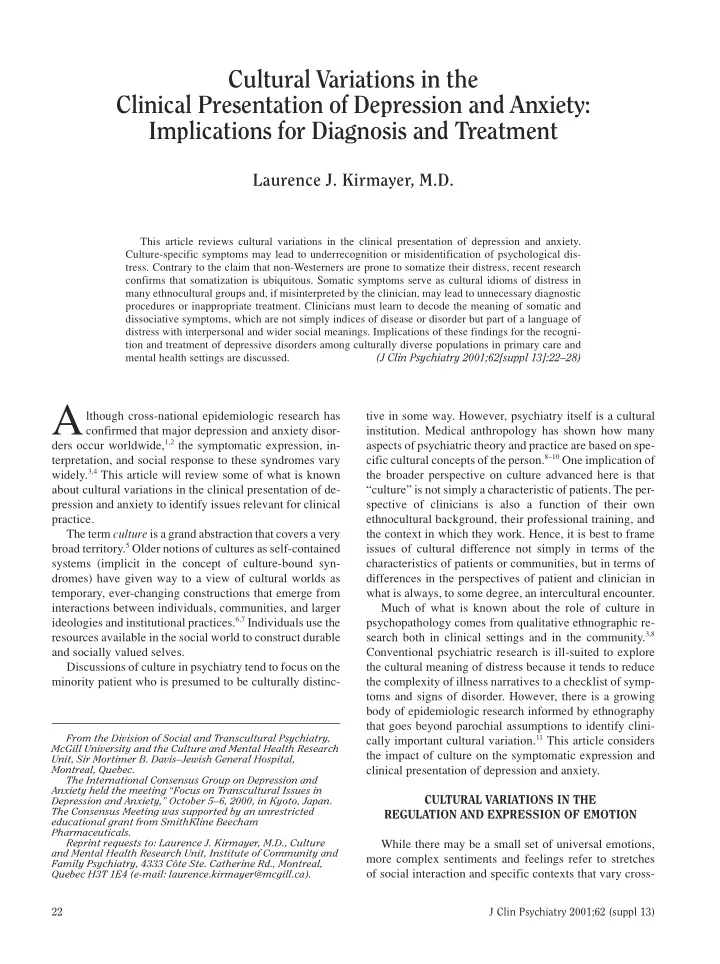

Laurence J. Kirmayer Cultural Variations in the Clinical Presentation of Depression and Anxiety: Implications for Diagnosis and Treatment Laurence J. Kirmayer, M.D. This article reviews cultural variations in the clinical presentation of depression and anxiety. Culture-specific symptoms may lead to underrecognition or misidentification of psychological dis- tress. Contrary to the claim that non-Westerners are prone to somatize their distress, recent research confirms that somatization is ubiquitous. Somatic symptoms serve as cultural idioms of distress in many ethnocultural groups and, if misinterpreted by the clinician, may lead to unnecessary diagnostic procedures or inappropriate treatment. Clinicians must learn to decode the meaning of somatic and dissociative symptoms, which are not simply indices of disease or disorder but part of a language of distress with interpersonal and wider social meanings. Implications of these findings for the recogni- tion and treatment of depressive disorders among culturally diverse populations in primary care and (J Clin Psychiatry 2001;62[suppl 13]:22–28) mental health settings are discussed. A lthough cross-national epidemiologic research has tive in some way. However, psychiatry itself is a cultural confirmed that major depression and anxiety disor- institution. Medical anthropology has shown how many ders occur worldwide, 1,2 the symptomatic expression, in- aspects of psychiatric theory and practice are based on spe- cific cultural concepts of the person. 8–10 One implication of terpretation, and social response to these syndromes vary widely. 3,4 This article will review some of what is known the broader perspective on culture advanced here is that about cultural variations in the clinical presentation of de- “culture” is not simply a characteristic of patients. The per- pression and anxiety to identify issues relevant for clinical spective of clinicians is also a function of their own practice. ethnocultural background, their professional training, and The term culture is a grand abstraction that covers a very the context in which they work. Hence, it is best to frame broad territory. 5 Older notions of cultures as self-contained issues of cultural difference not simply in terms of the systems (implicit in the concept of culture-bound syn- characteristics of patients or communities, but in terms of dromes) have given way to a view of cultural worlds as differences in the perspectives of patient and clinician in temporary, ever-changing constructions that emerge from what is always, to some degree, an intercultural encounter. interactions between individuals, communities, and larger Much of what is known about the role of culture in ideologies and institutional practices. 6,7 Individuals use the psychopathology comes from qualitative ethnographic re- search both in clinical settings and in the community. 3,8 resources available in the social world to construct durable and socially valued selves. Conventional psychiatric research is ill-suited to explore Discussions of culture in psychiatry tend to focus on the the cultural meaning of distress because it tends to reduce minority patient who is presumed to be culturally distinc- the complexity of illness narratives to a checklist of symp- toms and signs of disorder. However, there is a growing body of epidemiologic research informed by ethnography that goes beyond parochial assumptions to identify clini- From the Division of Social and Transcultural Psychiatry, cally important cultural variation. 11 This article considers McGill University and the Culture and Mental Health Research the impact of culture on the symptomatic expression and Unit, Sir Mortimer B. Davis–Jewish General Hospital, Montreal, Quebec. clinical presentation of depression and anxiety. The International Consensus Group on Depression and Anxiety held the meeting “Focus on Transcultural Issues in CULTURAL VARIATIONS IN THE Depression and Anxiety,” October 5–6, 2000, in Kyoto, Japan. The Consensus Meeting was supported by an unrestricted REGULATION AND EXPRESSION OF EMOTION educational grant from SmithKline Beecham Pharmaceuticals. Reprint requests to: Laurence J. Kirmayer, M.D., Culture While there may be a small set of universal emotions, and Mental Health Research Unit, Institute of Community and more complex sentiments and feelings refer to stretches Family Psychiatry, 4333 Côte Ste. Catherine Rd., Montreal, Quebec H3T 1E4 (e-mail: laurence.kirmayer@mcgill.ca). of social interaction and specific contexts that vary cross- 22 J Clin Psychiatry 2001;62 (suppl 13)
Recommend
More recommend